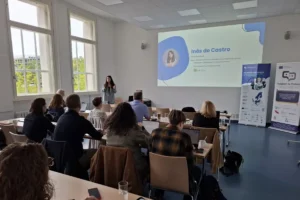A EU-funded initiative is revolutionising prisoner rehabilitation by providing comprehensive training for inmates and trainers. The project aims to reduce recidivism by enhancing vocational education and training (VET) programmes. This initiative seeks to equip participants with the skills needed to reintegrate into society, offering practical guidance and successful examples of transformative training initiatives.
Training the Trainers
Historically, punitive “tough on crime” approaches have been politically popular to justify stringent criminal justice policies. However, empirical evidence shows that extended incarceration alone is neither a sufficient deterrent nor an economically sustainable approach to reducing recidivism rates[1]. Research indicates that up to 89% of those who return to prison are unemployed, highlighting education as a critical factor in reducing recidivism [2].
Education and training are, therefore, not just a means of keeping the incarcerated individual occupied, they can form a stepping stone in the pathway towards inclusion, who face social exclusion often before they enter the prison, as well as after they leave.
With this in mind, the STEP2LAB project, funded by the European Union and nearing its completion, has been working around the training of inmates and those closest to them – trainers. The project’s “Training of Trainers” (ToT) course aims to equip participants with the knowledge, guidelines, framework, and workflows essential to the GTI (Guiding, Training, and Insertion) cooperation process, in line with the STEP2LAB model. Over sixty participants have joined the course, eager to learn how to implement STEP2LAB tools and empower individuals to become change agents within their communities.
The training will continue until the project’s conclusion, providing participants with a comprehensive and immersive experience. This extensive training programme serves as a cornerstone for disseminating best practices and methodologies.
Bridging Prisons and the Labour Market
STEP2LAB has recently introduced its Model of Guidance, Training, and Insertion into the labour market. This model provides an in-depth understanding of vocational education and training (VET) programmes and their role in assisting incarcerated individuals to reintegrate into the labour market.
The goal of this model is to offer practical guidance and examples to enhance the effectiveness of training and labour insertion initiatives within European Union prison systems.
Policymakers, prison administrators, training providers, and other stakeholders involved in designing and implementing vocational training programmes within the prison system are the targets of this document, where there’s an exploration of the critical components and successful examples of VET programmes, including the STEP2LAB Computer-Aided Design (CAD) Induction Course.
The STEP2LAB Model aspires to contribute to more effective and transformative training initiatives for incarcerated individuals, ultimately aiding their transition back into the labour market and society.
Follow the project’s progress, and all deliverables, through its newsletter and find it featured in the Justice Trends Magazine.
[1] Baumgartner, F. R., Tamira Daniely, T., Kalley Huang, K. et al. (2021). Throwing Away the Key: The Unintended Consequences of “Tough-on-Crime” Laws. Cambridge University Press – American Political Science Association, 19(4), 1233-1246.
[2] Kimmitt, S. (2011). The impact of community context on the risk of recidivism among parolees at one-, two-, and three- year follow-ups. Ohio State University.
Know more about this project

STEP2LAB
Systematic Transition from Prison into the Labour Market
STEP2LAB is led by the Portuguese project’s coordinator CENTIMFE (Technological Center for Molds, Special Tools and Plastics Industry).
The remaining consortium members of the STEP2LAB project are IPS_Innovative Prison Systems (Portugal), Mioveni Penitentiary (Romania), Greta du Velay (Velay Region Educational Institutions Group) (France), IRFIP (Religious Institute of Vocational Education and Training – Romania), CIRE (Center for Reintegration Initiatives – Catalonia, Spain), and KIMW-Q (Non-profit KIMW Qualification Association – Germany).
For more information on the STEP2LAB project, please visit its page.
Related projects

VR4React
Reducing Reactive Aggression through Virtual Reality

VR4DRUG Rehab
Developing and Using Virtual Reality Technology for the Rehabilitation of Drug Users in Probation Services

VISION
Visualising the Future Through Training

ViRTI
Virtual reality for training inmates

Turning Blue
Integrating Young Offenders Through the Blue Economy

TRIANGLE
Secured digital education system for vocational skills for youngsters in closed institutions

TRAIVR
Training of Refugee Offenders by Virtual Reality

SPORT4PRISONS
New sports method for prisons as a tool to support competency development, positive values, and reintegration

RE[ENTER]
Strengthening the capacity of criminal justice professionals and volunteers

Probationet
A flexible, multidisciplinary and transnational VET model for the PROBATION services and practitioners

PREVEX
Preventing Emotional and Sexual Abuse Among Young People

PPROMPT
Peer Pro-Social Modeling in Probation
Related news

IPS showcases virtual reality solutions for skills development and stress management at Berlin workshop
Read More »
IN2PREV Final Conference highlights cross-sector collaboration for refugee inclusion and radicalisation prevention
Read More »
JUSTICE TRENDS Magazine Launches 14th Edition: Expanding the Frontiers of Rehabilitation Support
Read More »





